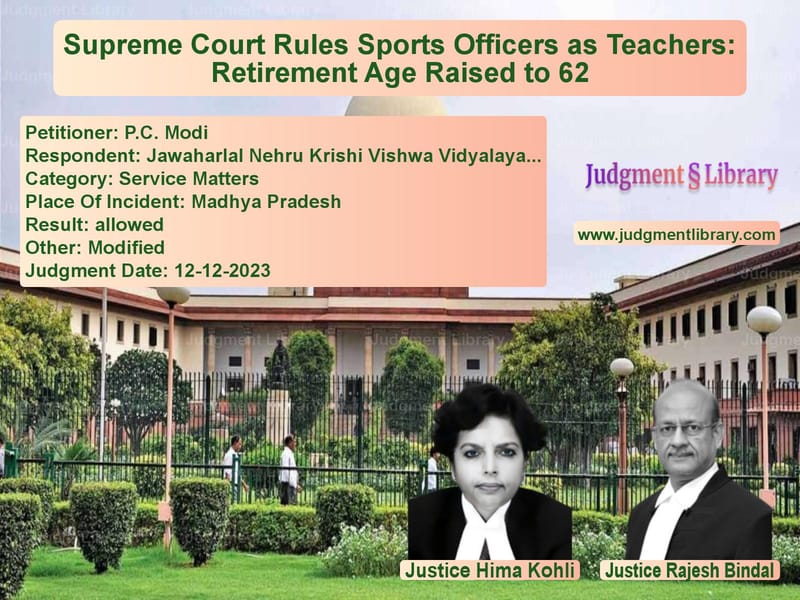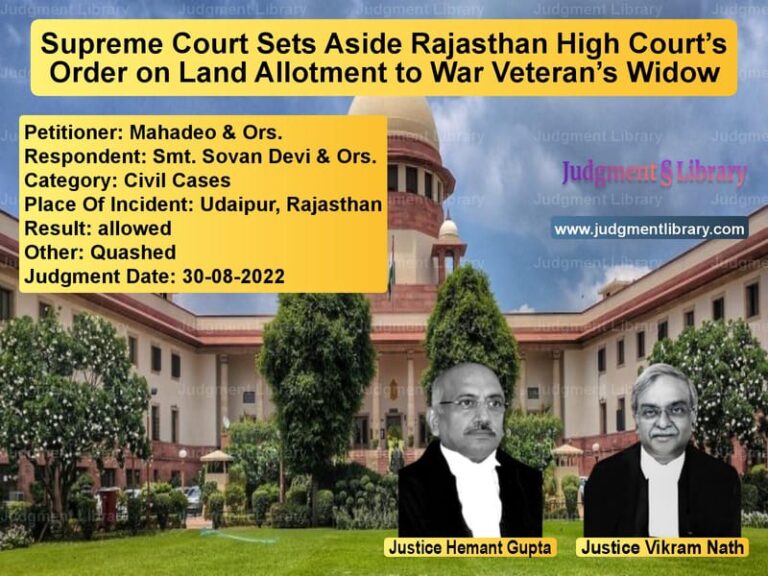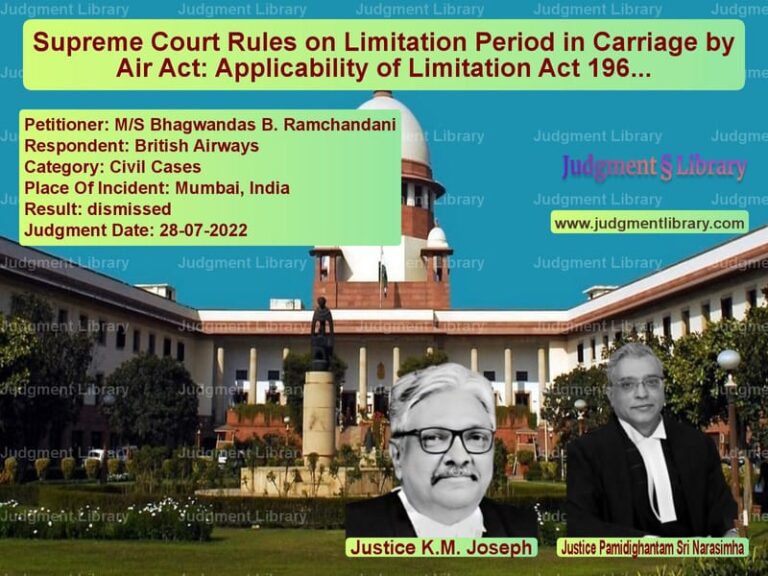Supreme Court Rules Sports Officers as Teachers: Retirement Age Raised to 62
The case of P.C. Modi v. Jawaharlal Nehru Krishi Vishwa Vidyalaya & Another is a landmark decision where the Supreme Court clarified the status of a Physical Training Instructor (PTI)/Sports Officer in an educational institution. The judgment revolved around whether a Sports Officer falls under the definition of a ‘teacher’ and is thereby entitled to a higher retirement age of 62 years.
Background of the Case
The appellant, P.C. Modi, was employed as a Sports Officer/PTI at the respondent institution, Jawaharlal Nehru Krishi Vishwa Vidyalaya. The university informed him via an order dated June 27, 2000, that he would retire on June 30, 2000, upon reaching the age of 60. However, the appellant argued that he should be allowed to serve until 62 years, as his role fell within the definition of a ‘teacher’ under Statute 32 of the university.
He contended that:
- His duties included imparting physical education to students, which aligns with teaching responsibilities.
- The university’s regulations classified faculty members as teachers, and his position was functionally equivalent.
- Government policies, including notifications from the Ministry of Human Resource Development, had extended the retirement age of teachers to 62 years.
The appellant approached the Madhya Pradesh High Court, challenging his forced retirement at 60 years. The Single Judge Bench ruled in his favor on April 26, 2005, holding that he was a teacher under the statute and entitled to retire at 62 years. The university, however, challenged this decision, leading to a Division Bench judgment on December 14, 2009, which reversed the earlier ruling. Dissatisfied with this decision, the appellant appealed to the Supreme Court.
Legal Issues Raised
- Does a Sports Officer/PTI fall under the definition of a ‘teacher’ as per the university statute?
- Is the retirement age of a Sports Officer/PTI equivalent to that of a professor or lecturer?
- Should the university’s classification of ‘non-teaching staff’ be strictly interpreted?
Arguments of the Appellant
The appellant argued:
- His role involved imparting education in physical training and sports, which aligns with the statutory definition of a teacher.
- The Ministry of Human Resource Development had extended the retirement age for physical education personnel, which should apply to him.
- Previous court rulings, such as P.S. Ramamohana Rao v. A.P. Agricultural University, supported the inclusion of Physical Education personnel under the ‘teacher’ category.
- The Andhra Pradesh Agricultural University (Conditions of Service) Regulations, 1965, had been interpreted similarly, suggesting his eligibility for extended service tenure.
Arguments of the Respondents
The university countered:
- The retirement age of non-teaching staff was clearly set at 60 years.
- The appellant was not listed under the university’s classification of ‘teachers’ in Statute 32.
- The Board of Management had categorized Sports Officers under ‘non-teaching service personnel’ during its 160th meeting in June 2000.
- Physical training did not involve academic instruction, making the appellant ineligible for inclusion in the ‘teacher’ category.
Supreme Court’s Observations
1. Definition of ‘Teacher’ Under Statutory Framework
The Supreme Court examined the university’s statute and found that Section 2(x) of the Jawaharlal Nehru Krishi Vishwa Vidyalaya Act defines a teacher as:
“A person appointed or recognized by the Vishwa Vidyalaya for the purpose of imparting instructions and/or conducting and guiding research and/or extension programmes and includes a person who may be declared by the statutes to be a teacher.”
Based on this, the Court noted that a teacher is not restricted to traditional lecturers and professors but includes individuals engaged in instructional roles.
2. Role of a Sports Officer in Academic Instruction
The Court found that the appellant’s duties went beyond administrative tasks and included:
- Training students in various sports.
- Guiding students on fitness, techniques, and rules of games.
- Conducting sports education as part of university curriculum.
As per precedent set in P.S. Ramamohana Rao’s case, where Physical Directors were classified as teachers, the Supreme Court found a strong analogy in favor of the appellant.
3. Precedents in Similar Cases
The Court distinguished this case from State of Madhya Pradesh v. Ramesh Chandra Bajpai, where Physical Training Instructors were not given UGC scales. The present case was different as it involved the question of retirement age, not pay parity.
4. University’s Inconsistent Application of Rules
The Court noted:
“The University had previously permitted certain categories of staff engaged in instructional roles to retire at 62 years. It is inconsistent to exclude Physical Training personnel from the same category.”
Final Judgment
The Supreme Court ruled:
- The decision of the Division Bench of the High Court was set aside.
- The appellant was declared a teacher and entitled to retirement at 62 years.
- The university was directed to provide all financial benefits as if the appellant had served till 62 years.
- The appellant was entitled to arrears of salary and pension benefits.
The Court concluded:
“The appellant, being engaged in instructional work, falls within the definition of a teacher and is entitled to be treated at par with other academic staff.”
Key Takeaways
1. Sports Officers and PTIs Can Be Classified as Teachers
Personnel involved in instructional activities, even in non-traditional academic roles, can be considered teachers.
2. Precedents Support Broad Interpretation of ‘Teacher’
Past rulings indicate that faculty engaged in student instruction, including sports, qualify as teachers.
3. Retirement Age Must Be Uniform for All Educators
The judgment ensures consistency in retirement age policies across different teaching categories.
4. Supreme Court Corrects Inconsistent Application of Laws
Universities must apply rules consistently and cannot arbitrarily exclude certain teaching personnel.
Conclusion
The Supreme Court’s decision is a landmark ruling ensuring fairness for educators engaged in instructional roles. By recognizing Physical Training Instructors and Sports Officers as teachers, it upholds equitable treatment in retirement benefits and service tenure, setting a precedent for similar cases nationwide.
Petitioner Name: P.C. Modi.Respondent Name: Jawaharlal Nehru Krishi Vishwa Vidyalaya & Another.Judgment By: Justice Hima Kohli, Justice Rajesh Bindal.Place Of Incident: Madhya Pradesh.Judgment Date: 12-12-2023.
Don’t miss out on the full details! Download the complete judgment in PDF format below and gain valuable insights instantly!
Download Judgment: p.c.-modi-vs-jawaharlal-nehru-kri-supreme-court-of-india-judgment-dated-12-12-2023.pdf
Directly Download Judgment: Directly download this Judgment
See all petitions in Pension and Gratuity
See all petitions in Employment Disputes
See all petitions in Judgment by Hima Kohli
See all petitions in Judgment by Rajesh Bindal
See all petitions in allowed
See all petitions in Modified
See all petitions in supreme court of India judgments December 2023
See all petitions in 2023 judgments
See all posts in Service Matters Category
See all allowed petitions in Service Matters Category
See all Dismissed petitions in Service Matters Category
See all partially allowed petitions in Service Matters Category







